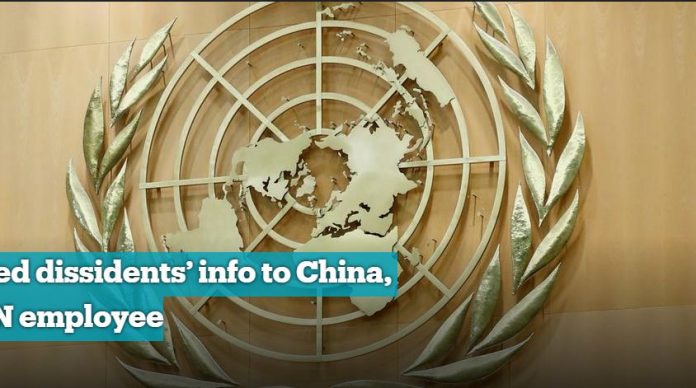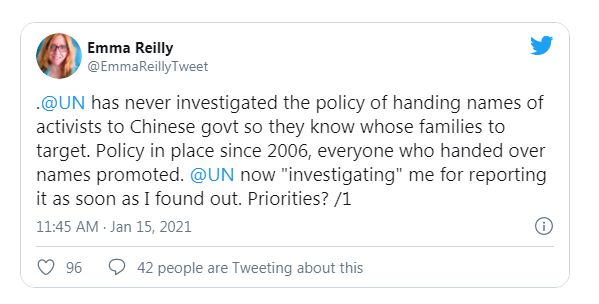Emma Reilly, an OHCHR employee and human rights lawyer, accuses the UN of trading the background information of dissidents with China in what has been dubbed a name-sharing scandal.
The United Nations High Commissioner for Human Rights (OHCHR) shared the names of Tibetan, Hong Kong, and Uighur dissidents with the Chinese government, according to Emma Reilly, a human rights lawyer who works at OHCHR.
Reilly’s claim has taken on a new dimension with new documents and correspondences accessed by the Anadolu Agency.
Reilly has repeatedly raised these allegations while on active duty at OHCHR.
She had had several email correspondences with OCHR staff, press officers, and coworkers, flagging the issue with utmost urgency.
As Reilly’s concerns became public knowledge, the UN Human Rights Office came under fire. The ones whose names were given to China were mainly Uighur activists, Tibetans and Hongkongers, who took part in UN activities, for a long period.
Reilly recently provided the emails she received, while working actively at the UN body, to the Anadolu Agency.
Even though the OHCHR was quick to deny such allegations, the emails between its employees, press releases and interviews revealed that the UN shared the names of many activists as well as some opponents with the Chinese government who attended panel discussions, conferences, and open sessions on human rights.
Last week on Twitter, Reilly said that she could be dismissed after accusing her employer of sharing the names of Chinese government opponents who took part in UN activities.
The OHCHR has however repeatedly defended itself saying the controversial practice of sharing background information of dissidents has ceased in 2015.
But an OHCHR press release issued in 2017 confirms that the Chinese authorities “regularly” asked the UN office to confirm whether particular names were attending their meetings.
“Chinese authorities, and others, regularly ask the UN Human Rights Office, several days or weeks prior to Human Rights Council meetings, whether particular NGO delegates are attending the forthcoming session. The Office never confirms this information until the accreditation process is formally under way, and until it is sure that there is no obvious security risk,” the press release read.
Several human rights organisations such as UN Watch and Human Rights Watch argue that the UN’s move puts not only the lives of Chinese activists and dissidents at risk, but also exposes their families and relatives to harm.
Reilly has maintained that the UN continues to share names and background information of dissidents with other countries.
Talking to Anadolu Agency about her experiences after reporting the issue, she said; “I don’t actually have a job. The UN continues to pay me a salary that I have no terms of reference. They can’t fire me because they know I’m telling the truth. But they don’t want me doing any work.”
As per the emails, several incidents took place between 2012 and 2019. On September 7, a diplomat from the Chinese Mission to the UN office in Geneva, asked as a “usual practice” an NGO liaison officer at the OHCHR whether anybody from the list the diplomat had sent to the 21st session of the HRC, had requested accreditation.
The officer passed on two names to the Chinese diplomat in a responding email: Dolkun Isa and He Geng.
Isa was a prominent Uighur politician and activist who attended the UN Human Rights Council meetings in Geneva in 2016 and 2019. Reilly said that Dolkun Isa also testified in her favour.
“Chinese agents visited his family home to tell him to stop his advocacy. He’s been arrested several times. He was refused entry into the UN itself as a direct result of his name being given to the Chinese government. His brother was arrested,” she added.
Going further about her allegations, Reilly said the UN’s practice was “complicit in international crimes”.
“The UN Human Rights Office should not be actively endangering human rights defenders. And that shouldn’t be controversial. And it has been shocking that the only concern of the Human Rights Office has been to stop me reporting it, but not to stop the practice.”
The UN’s denial
Speaking to the Anadolu Agency on January 14, OHCHR Spokesperson Rupert Colville said; “For the past five years, OHCHR has not confirmed the names of individual activists accredited to attend UN Human Rights Council sessions to any State. Ms. Reilly’s repeated claims the practice continues to this day are false.”
However, Dolkun Isa who testified in favour of Emma Reilly told Anadolu Agency that they wanted to attend the UN Human Rights Council meeting in 2013 with Uighur activist Rabia Kadir and other Uighurs, but that the police attempted to get them out of the council room, which he says was the result of pressure from Chinese authorities.
Isa, who is also the president of the World Uyghur Congress, also added that in 2018, a Chinese diplomat called him a “terrorist” and tried to stop him from entering the UN. The issue was later solved by Germany’s initiative.
The Uighur activist also noted that in 2017 he was detained before a meeting in Italy – again due to pressure from China.
According to Isa, he has not been able to contact any family member since 2017. Also in 2018, Isa says his mother died in a “concentration camp” in China in 2018, and his older brother was arrested, while his younger brother has been missing since 2016.
Later on, he also learned from the Chinese daily Global Times that his father was dead although he had no idea when or where he had died.


















